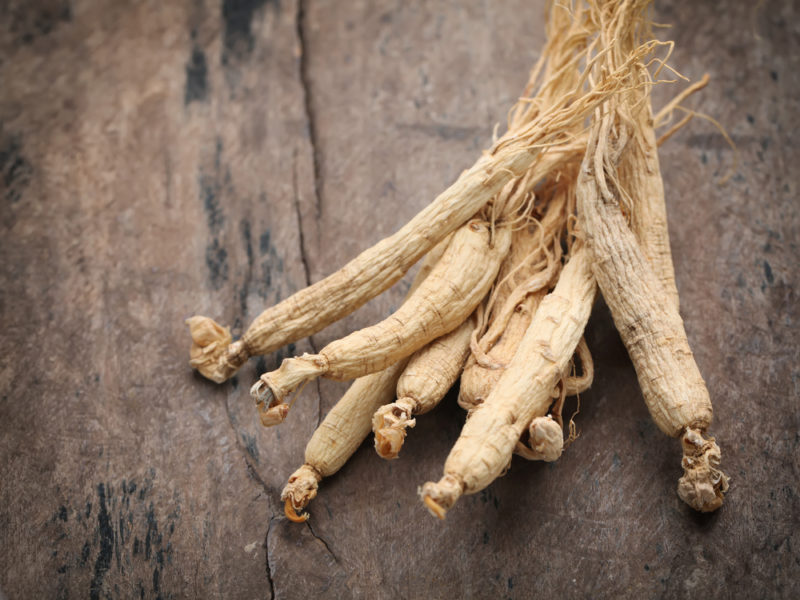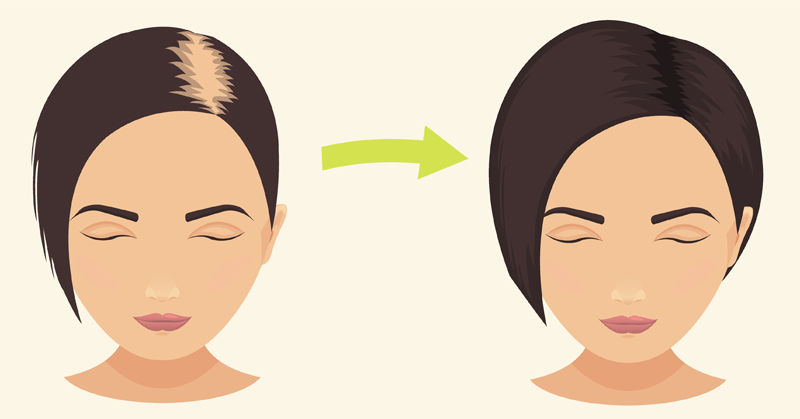Alopecia areata is a medical condition that causes the immune system to attack the hair follicles, which leads to the hair falling out in round patches. (1) Researchers believe that alopecia areata causes include genetics and environmental factors such as psychological stress and trauma, that trigger an over-reactive immune system. (2)
Conventional treatment often includes corticosteroids, imunosuppressants and other medications. Alopecia areata natural treatment focuses more on foods and supplements that support hair growth. Hair loss natural treatments come without the dangerous side effects of prescription creams and medications.
As always, be sure to check with a medical professional who will be able to look at your specific situation and determine a cause. There are several different conditions that can cause hair loss and it’s always a good idea to rule out any of the other, more serious ones.
Once you’re sure you’re dealing with alopecia areata, consider the following lifestyle and dietary changes as part of your arsenal for combatting the illness.

Alopecia Areata Natural Treatments
1. Probiotics
Probiotics can help treat many autoimmune conditions, including hair loss. They work to improve the immune system and stop overreactions that cause inflammation. Probiotic foods include kimchi, kefir, kombucha and cultured vegetables.
You can also find probiotics in supplement form. These can be a more convenient form of probiotics considering the fact that a supplement is much easier to reach for and take than a meal is to prepare. Probiotic supplements aren’t without their downsides, however.
For one, some of the probiotic bacteria in the supplement may die before you get around to finishing the bottle. This can lead to you intaking less probiotic bacteria than you think.
This is why many probiotic supplement manufacturers have stopped making promises regarding how much probiotic bacteria is in any given bottle. Instead, they’ll often say how much is supposed to be in the bottle at the manufacturing stage, with the expectation that some of the bacteria will die by the time it reaches you.
Probiotic supplements also typically contain just one type of helpful bacteria, while probiotic foods will contain a variety.
The key is balancing these pros and cons. If a probiotic supplement helps you stay on track with your consumption, great! Just be sure to eat some probiotic food every once in a while as well.
2. Zinc
Zinc works as an alopecia areata natural treatment thanks to its ability to boost the immune system and repair the gut. Lower zinc levels are often linked to the condition. Foods high in zinc include pumpkin seeds, chickpeas, cashews and spinach.
If you drink alcohol regularly, that could be a sign that you need to look into your zinc levels. Your body needs various nutrients, including zinc, to process alcohol. When you go overboard with the alcohol consumption, your body pulls these nutrients out of your bloodstream and away from other functions.
You should also consider your zinc levels if you’re experiencing any of the following symptoms in addition to your hair loss:
- Acne
- Eczema
- Night blindness (in severe cases)
- Loss of appetite
- Low mood
In addition to eating food with zinc, you can also take zinc supplements. Men should consume an average of 11 mg of zinc per day, while women need an average of 8 mg.

3. Quercetin
Quercetin is an antioxidant that reduces inflammation and fights free radical damage. People often use it to treat symptoms related to autoimmune disorders. (3) You can find quercetin supplements in a health food store.
Although quercetin is safe for short-term use, there are no studies into its effects over the long term or during pregnancy. If you’re pregnant, it’s best to air on the side of caution and avoid quercetin or at least speak with a medical professional before taking supplements.
4. Ginseng
Ginseng can be used as a hair loss natural treatment. It helps reduce inflammation in the body while boosting the immune system. A 2012 study found that red ginseng was an effective and natural treatment for alopecia areata. (4)
There are several ways to take ginseng. One of the most popular methods is as a tea. All you need is eight slices of ginseng root, some hot water and honey to taste.
If tea isn’t your thing, you can even just tuck a small chunk of ginseng root into your cheek and spit it out after the flavor of the root is gone. Be sure to use a small piece no larger than the tip of your pinky; any more can give you the jitters.
Yet another option is to use ginseng as a cooking spice. A slice of ginseng can add some nice flavor to a soup broth or even coffee.

5. Rosemary Essential Oil
You can use Rosemary oil topically to help enhance hair thickness. It increases cellular metabolism that stimulates hair growth.
The key when using essential oils topically is to dilute the mixture. In fact, most manufacturers will discourage you from putting the oil directly on your skin.
Depending on the oil’s strength, applying it directly to your skin could cause an irritation or even allergic reaction. Your specific essential oil provider should have instructions for using their oil topically. Generally, though, you’ll want to add 12 drops of your essential oil for every fluid ounce of your carrier oil.
Once you’ve got your diluted mixture, you can spray it on your skin.
6. Lavender Essential Oil
Lavender essential oil is a powerful antioxidant that helps reduce inflammation while healing and protecting the skin. Studies have shown that it works as an effective alopecia areata treatment. (5)
Remember to dilute your essential oil using the aforementioned steps.

7. Acupuncture
Acupuncture can help reduce the cells that attack hair follicles and cause hair loss. It also works to stimulate hair follicles, reduce inflammation and increase blood circulation, which promotes hair growth.
8. Anti-inflammatory Foods
Eating a healthy diet full of nutrient-dense, anti-inflammatory foods is one of the most important parts of treating any autoimmune disease, including alopecia areata. Replace packaged and processed foods with fresh, whole foods that provide the body with antioxidants. Eat anti-inflammatory foods such as leafy green vegetables, beets, blueberries, nuts, seeds and spices including turmeric and ginger. (6)


